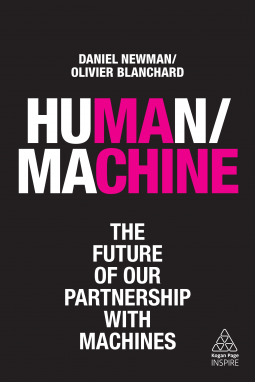
Human/Machine
The Future of our Partnership with Machines
by Daniel Newman; Olivier Blanchard
This title was previously available on NetGalley and is now archived.
Send NetGalley books directly to your Kindle or Kindle app
1
To read on a Kindle or Kindle app, please add kindle@netgalley.com as an approved email address to receive files in your Amazon account. Click here for step-by-step instructions.
2
Also find your Kindle email address within your Amazon account, and enter it here.
Pub Date Jul 03 2019 | Archive Date Aug 03 2019
Kogan Page Ltd | Kogan Page
Talking about this book? Use #HumanMachine #NetGalley. More hashtag tips!
Description
Will the workplace of the future be overrun by machines and robots? Are the new frontiers of artificial intelligence (AI) on the cusp of dethroning us in efficiency, intelligence and innovative potential? Automation and AI will augment our human world and potential.
The winners of the future of work are those that harness the power of machines to their advantage. Human/Machine is the only guide you need to understand the fourth industrial revolution. It sets out a road map to the challenges ahead, but also unlocks the wondrous opportunities that it offers.
Human/Machine explores how we will work symbiotically with machines, detailing how institutions, companies, individuals and education providers will evolve to integrate seamlessly with new technologies. With exclusive case studies, this book offers a glimpse into the future and details how top companies are already thriving on this very special relationship. From gamification in job training to project management teams integrated with bots and predictive technologies that fix problems in the supply chain before they happen, the authors deliver a powerful manifesto for the adoption and celebration of automation and AI. In a much more fluid, skills-based economy, we will all need to prove our worth and future-proof our skills base. This book offers a blueprint to avoid being left behind and unearth the opportunities unique to human-machine partnership ecosystems.
Available Editions
| EDITION | Other Format |
| ISBN | 9780749484248 |
| PRICE | $25.99 (USD) |
| PAGES | 248 |
Featured Reviews
 Dee A, Reviewer
Dee A, Reviewer
After reading this book, I felt somewhat redeemed. Over the last several years, I have discussed/argued/insisted that robots will NOT replace humans and take away all our jobs. I would point out that mankind has gone through transformations in the past, and each time more jobs were created and life actually got better. Years of reading sci-fi had presented many sides of this question, and helped to dispel any worrisome thoughts.
Receiving solid backup from authors Daniel Newman and Olivier Blanchard was encouraging. They even added the caveat that it would be in everyone’s best interest to begin preparing for this new world now, something I had also preached. My nuts and bolts knowledge didn’t extend much beyond these talking points. Fortunately, the authors have put plenty of thought and time into this subject, and presented a book full of facts.
Human/Machine goes into depth on the possibilities that await us while preferring not to get too far ahead of current reality. Although periodically the book would peer 30 years into the future, most of the book focuses on the present and moving through the next decade (leaving the prognosticating to those brave enough to take their crystal balls out of the closet. The authors recognized that there are too many variables preventing a reliable vision into what the future may look like in 2050).
I thought it was helpful to dive into specific areas, addressing which jobs might be more at risk. This took us into white- and blue-collar jobs, and eventually into job categories and titles. The authors offered suggestions, sharing preparatory steps for any of us to take to be ready for the job shifts (and in reality, doesn’t retaining any job have a lot to do with being valuable to the company you work for?). Other chapters dealt with the ethics and morality of what tech companies create (think Big Brother, then consider the exact opposite) and embracing a future where humans work in more of a symbiotic relationship with AI rather than one that is adversarial.
Newman/Blanchard do inject repetition of their common themes throughout the book (prepare for the upcoming changes, work with rather than against robots, etc.), a bit bothersome when I felt I had “got it” the first time around. Even though on several occasions they insisted the book was for the normal person out in the job market, there were many terms and acronyms used without layman explanations. In retrospect, maybe this was their way of reminding me how I already interact with machines and programming, because at those moments, Google was my friend.
I recommend this book, especially those between the ages of 15-55 (and anyone 55+ who wishes to remain longer in the job market). Although there is repetition of themes/thoughts in the book, the message is clear: Anyone can be a thriving part of the future economy, but the time to prepare for it is now. Three stars.
My thanks to NetGalley and Kogan Page Ltd for a complimentary ebook of this title.



